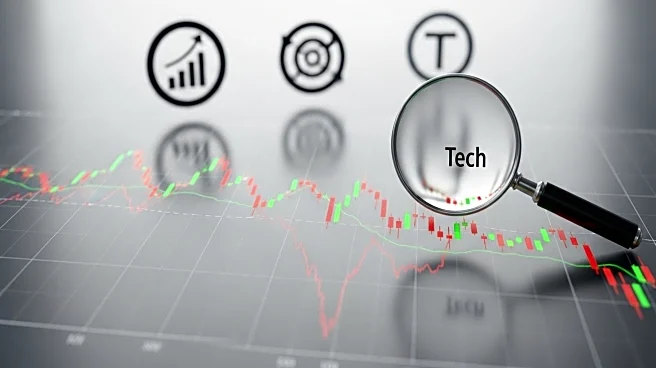What's Happening?
Tuesday's market session experienced significant volatility, with tech and artificial intelligence stocks pulling back while broader economy companies saw gains. CNBC's Jim Cramer highlighted this shift, noting that the market's earlier gains were driven
by non-tech sectors, which he referred to as the 'Rip Van Winkle economy.' The session was influenced by Federal Reserve Chair Jerome Powell's comments and escalating trade tensions between the U.S. and China. President Trump intensified these tensions with a Truth Social post suggesting potential business terminations with China over cooking oil, in retaliation for China's refusal to purchase U.S. soybeans. The S&P 500 fluctuated, losing up to 1.5% before closing down 0.2%, while the Dow Jones Industrial Average rose nearly 1% at one point, closing up 0.4%. The Nasdaq Composite fell as much as 2.1% during the session, closing down 0.8%.
Why It's Important?
The shift in market dynamics underscores the impact of geopolitical tensions and Federal Reserve policies on investor sentiment. The pullback in tech stocks, which have been leading the market, suggests a potential recalibration towards sectors representing the broader economy. Cramer emphasized the importance of the housing market as a proxy for economic health outside the tech sector, noting that the Fed's bond selling has kept mortgage rates elevated. The strong earnings from big banks like Wells Fargo and gains in retail home improvement stocks indicate potential growth in the housing sector. This shift could benefit industries tied to consumer spending and housing, while tech stocks may face increased scrutiny and volatility.
What's Next?
Future market movements will likely depend on the Federal Reserve's decisions regarding bond holdings and interest rates, as well as the resolution of trade tensions between the U.S. and China. Investors may look for signs of a conciliatory approach from President Trump to ease tensions and stabilize markets. The performance of non-tech sectors could continue to influence market trends, with potential growth in housing and consumer spending sectors. Stakeholders will be closely monitoring geopolitical developments and central bank policies for indications of market direction.
Beyond the Headlines
The current market volatility highlights the interconnectedness of global trade policies and domestic economic health. The potential shift from tech-driven growth to broader economic sectors may reflect a long-term trend towards diversification in investment strategies. Ethical considerations regarding trade policies and their impact on global relations could influence future political and economic decisions. The evolving market landscape may prompt businesses to reassess their strategies in response to changing consumer demands and geopolitical challenges.















